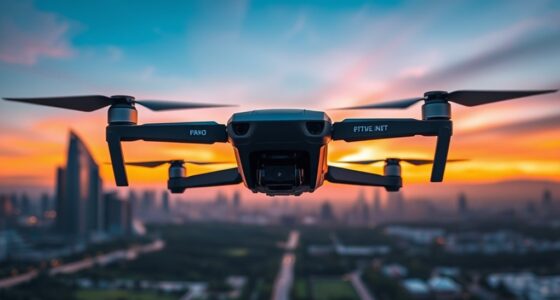Welcome to our conversation about common inquiries concerning the effects of AI on Industrial Manufacturing.
In this article, we delve into the game-changing impact of artificial intelligence on the manufacturing industry. From increased efficiency and productivity to predictive maintenance and enhanced safety, AI is transforming the way factories operate.
Join us as we unravel the intricacies of this cutting-edge technology and uncover its potential to revolutionize the future of manufacturing.
Get ready to be inspired by the possibilities that lie ahead!

Key Takeaways
- AI-powered automation systems increase efficiency and productivity in industrial manufacturing.
- AI technologies like machine learning and computer vision enhance product quality and minimize defects.
- AI predicts maintenance needs and optimizes equipment performance in industrial manufacturing.
- AI ensures a secure work environment and enhances safety in industrial manufacturing.
Increased Efficiency and Productivity
One of the key benefits of implementing artificial intelligence (AI) in industrial manufacturing is how it can significantly increase efficiency and productivity. By using AI-powered automation systems, tasks that were once done manually can now be performed with greater speed and accuracy.
This automation impact allows for a reduction in labor, as AI technology can handle repetitive and mundane tasks, freeing up human workers to focus on more complex and strategic activities.
With AI, manufacturing processes can be optimized and streamlined, minimizing errors and maximizing output. Through advanced algorithms and machine learning capabilities, AI can analyze vast amounts of data in real-time, identifying patterns and making predictions to improve decision-making and resource allocation.
Quality Improvement and Defect Reduction
We can enhance the quality of products and minimize defects through the implementation of AI in industrial manufacturing. By employing AI technologies such as machine learning and computer vision, we can achieve continuous monitoring of production processes, enabling us to detect and address potential defects in real-time. AI algorithms can analyze vast amounts of data from sensors and cameras, identifying patterns and anomalies that human operators may miss. This allows for proactive intervention and process optimization to prevent defects before they occur. To illustrate the impact of AI on quality improvement and defect reduction, consider the following table:

| AI Application | Benefits |
|---|---|
| Automated inspection | Accurate defect detection and classification |
| Predictive analytics | Early identification of potential quality issues |
| Intelligent feedback | Real-time feedback to operators for process refinement |
| Root cause analysis | Identification of underlying causes of defects |
| Quality control system | Consistent and standardized inspection procedures |
With AI-driven quality improvement, manufacturers can significantly reduce defects, enhance product quality, and meet the ever-increasing demands of the market.
Predictive Maintenance and Equipment Optimization
To ensure efficient operations and minimize downtime, AI enables us to predict maintenance needs and optimize equipment performance in industrial manufacturing. By utilizing advanced algorithms and machine learning techniques, AI can analyze vast amounts of data collected from sensors and other sources to identify patterns and anomalies that may indicate potential equipment failures or performance issues.
This approach, known as condition monitoring, allows us to proactively address maintenance needs before they lead to costly breakdowns or disruptions in production. Additionally, AI can optimize asset management by analyzing data on equipment usage, energy consumption, and other factors to identify opportunities for improvement and efficiency gains.
By leveraging AI-powered predictive maintenance and equipment optimization, manufacturers can’t only increase productivity and reduce costs but also extend the lifespan of their assets and enhance overall operational effectiveness.

Transitioning to the next section, AI also plays a crucial role in enhancing safety and mitigating risks in industrial manufacturing.
Enhanced Safety and Risk Mitigation
As we delve into the topic of enhanced safety and risk mitigation in industrial manufacturing, it’s crucial to acknowledge the pivotal role that AI plays in ensuring a secure and hazard-free work environment. AI technology has revolutionized safety protocols and hazard prevention measures, making industrial manufacturing safer than ever before. Here are five ways AI enhances safety in the manufacturing industry:
-
Real-time monitoring: AI systems continuously monitor the production environment, detecting any potential hazards or safety breaches instantly.
-
Predictive analytics: AI algorithms analyze vast amounts of data to identify patterns and predict potential safety risks, allowing for proactive measures to be taken.

-
Automated safety inspections: AI-powered robots can perform safety inspections and identify any equipment malfunctions or safety hazards, reducing the risk of accidents.
-
Intelligent alert systems: AI can send real-time alerts to workers and supervisors, notifying them of any safety concerns or emergency situations.
-
Virtual simulations and training: AI enables virtual simulations of hazardous scenarios, providing workers with realistic training experiences that enhance their safety awareness and response skills.
With AI’s advanced capabilities, industrial manufacturing can achieve a higher level of safety and risk mitigation, paving the way for innovation and progress in the industry.

Supply Chain Optimization and Demand Forecasting
Supply chain optimization and demand forecasting are critical components for efficient and responsive industrial manufacturing operations. With the help of AI, these processes are being revolutionized, leading to significant improvements in inventory management and production planning.
AI algorithms can analyze vast amounts of data, including historical sales, market trends, and customer behavior, to generate accurate demand forecasts. This enables manufacturers to optimize their inventory levels, reducing carrying costs and minimizing stockouts.
AI-powered systems can also identify patterns and correlations across the supply chain, enabling better coordination between suppliers, manufacturers, and distributors. By automating and streamlining these processes, AI improves operational efficiency, reduces lead times, and enhances overall customer satisfaction.
As AI continues to advance, we can expect even greater optimization and forecasting capabilities, enabling manufacturers to meet consumer demand with precision and agility.

Frequently Asked Questions
How Does AI Impact Job Security in the Manufacturing Industry?
AI’s impact on job security in manufacturing is significant. Job displacement is a reality as AI automates tasks previously done by humans. However, this also leads to a workforce evolution, where new roles emerge that require advanced technical skills.
Can AI Be Used to Improve the Environmental SustAInability of Industrial Manufacturing?
Yes, AI can play a significant role in improving the environmental sustainability of industrial manufacturing. By optimizing processes and reducing waste, AI can help minimize the energy consumption and overall environmental impact of manufacturing operations.
What Are the Potential Ethical Implications of Using AI in Manufacturing?
Using AI in manufacturing raises ethical considerations and has a significant social impact. We must carefully navigate potential issues such as job displacement, data privacy, and algorithmic bias to ensure a responsible and inclusive implementation.
How Can AI Help Manufacturers Adapt to Changing Market Demands and Trends?
Predictive analytics and supply chain optimization are key ways AI helps manufacturers adapt to market demands. By analyzing data and trends, AI enables proactive decision-making and agile production processes, keeping manufacturers ahead of the curve.

What Challenges and Barriers Exist in Implementing AI in Industrial Manufacturing?
Challenges and barriers in implementing AI in industrial manufacturing include data privacy concerns, lack of skilled workforce, and resistance to change. However, by addressing these issues, we can unlock the full potential of AI and achieve innovative solutions.
Conclusion
As we bid adieu to this enlightening journey through the revolutionary effects of AI in industrial manufacturing, one can’t help but marvel at the seamless intertwining of human ingenuity and technological prowess.
Like the intricate threads of a well-crafted tapestry, AI has woven its way into every aspect of the manufacturing process, enhancing efficiency, quality, safety, and supply chain dynamics.
As we embrace this new era, let’s cherish the symbiotic relationship between man and machine, for together, we shall forge a future of unparalleled innovation and prosperity.











